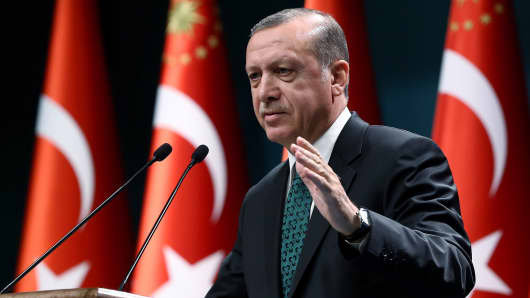
Kayhon Ozer | AFP | Getty Images
Turkish President Recep Tayyip Erdogan delivers a speech to lawyers at the Presidential Complex in Ankara, Turkey on April 5, 2016.
The reason behind the Turkish president's maneuvers is to force European authorities to take a more accommodating approach to Turkish legislation and practices. Erdogan calculates that Europe needs Turkey more than vice-versa, given the threat of a renewed deluge of Syrian migrants to EU member states.
But Erdogan is all too aware he would benefit from a successful migrant deal. The lifting of long-standing and humiliating visa restrictions for Turkish nationals would represent one of the government's most significant diplomatic feats to date.
An imminent or freshly-adopted visa deal could help secure the extra votes Erdogan would like for a new constitution. Either through a referendum or following new parliamentary elections later this year, the president is seeking to adopt new legislation which would arm him with full, formal executive powers. Although Erdogan already exercises immense de-facto power, Turkish society is heavily polarised between supporters and opponents of the president.
Aid promised by the EU as part of the migrant deal is also a major factor - especially as Turkey is struggling to foot the bill of 2.75 million registered Syrian refugees. However, the 6 billion euros ($6.7 billion) in aid promised by the EU will be managed by international NGOs and UN agencies and not Turkey's own national authorities





